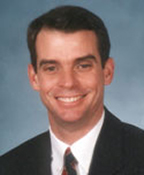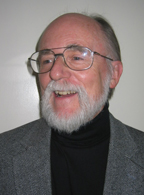
Terry Cline

Michael Quinn Patton

Highlights
25th Annual Conference ~ March 4 - 7, 2012
24th Annual Conference
23rd Annual Conference
Past Conferences
The 21st Annual Research Conference
Monday Plenary
On Monday, Feb. 25, the conference opened with remarks by Dr. Terry Cline, Administrator of the Substance Abuse and Mental Health Services Administration. With extensive experience in overseeing health and human services at the state level, Dr. Cline leads the $3.3 billion agency responsible for improving the nation’s substance abuse prevention, addictions treatment, and mental health service delivery systems. Throughout his career, Dr. Cline has championed the principle that mental health and freedom from substance abuse are fundamental to overall health and well-being and that mental and substance use disorders should be treated with the same urgency as any other health condition.
The Gwen Iding Brogden Distinguished Lecture Series
Getting to Maybe: Evalution, Systems Thinking, and Complexity Science
Michael Quinn Patton
Organizational development and evaluation consultant
Former President of the American Evaluation Association (AEA)
View Bio
Video and Handouts from this presentation
High-speed [WMV|QT] Dial-up [WMV]
Handouts [6mb pdf]
Monday's Gwen Iding Brogden Distinguished Lecturer was Michael Quinn Patton, a leader in evaluation, strategic planning, policy analysis, and management consulting. Patton is author of five evaluation books – one has been used by over 300 universities. His most recent book, Getting to Maybe: How the World Is Changed, focuses on complexity theory and systems thinking as frameworks for evaluation (a special book purchase and signing has been arranged for the conference). He is the only recipient of both the Alva and Gunner Myrdal Award from the Evaluation Research Society for "outstanding contributions to evaluation use and practice" and the Paul F. Lazarsfeld Award for lifetime contributions to evaluation theory from the American Evaluation Association. He was also awarded with the 2001 Lester F. Ward Award for Outstanding Contributions to Applied Sociology.
Patton shared real-life examples of social change and presented a new way of thinking about making change in communities through understanding the complex relationships between discrete elements. He was also available after the lecture for a question and answer session. In addition, a special book signing was for his new book: Utilization-Focused Evaluation and Getting to Maybe.
About the Center
Resources
- » Data Trends
- » School-Based Mental Health
- » Financing
- » Cultural Competence
- » Case Studies of System Implementation
- » Workforce Development & University-based Training
- » National Directory of Family-Run and Youth-Guided Organizations
- » Theory of Change Logic Models for SOC

